by Jenny Rose | Feb 25, 2023 | Connection & Community, Emotional Intelligence, Shadows
I found a brief offering in my Inbox from Seth Godin recently about bitterness being a wall we can lean against. The image caught my imagination. Since then, I’ve been thinking about walls … boundaries … supports … prisons … and the desperate, destructive choices we make to survive.
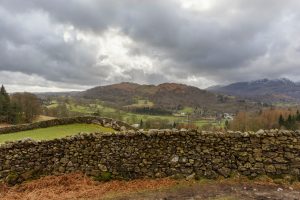
By Marc Pell on Unsplash
Walls. On the one hand, I like walls. I invariably position myself with my back against a wall when I’m in crowds or unfamiliar places. Nothing malignant can sneak up on me from behind. All my hypervigilance can go into watching my sides and front. I feel safe(er).
A corner is even better. Now two sides are covered.
A third wall, as in a blind alley or cul-de-sac, begins to feel more like a trap than a place of protection. What if I want to run away? I’m blocked on three sides.
A fourth wall? Now I’m in prison.
The thing about walls is they may keep danger out, but they keep everything else out, too. The good stuff. Love. Sunshine. Wandering children and butterflies. Inviting paths and trails. Possibility. Exploration. Views. Perspective. Wonderful surprises.
Walls, like everything else in life, can be taken too far. Built too wide and thick. Impenetrable. Too high to climb.
Shelter or dungeon?
What about metaphorical walls? What do we lean against because it’s familiar and we believe it keeps us safe from failure, from disappointment, from heartbreak?
Bitterness, certainly. We’ve risked. We’ve been vulnerable. It ended badly. We feel angry, disappointed, resentful. Never again, we tell ourselves. Things don’t work out for us. The world is against us. People suck. Life sucks. It’s our story, and we’re sticking to it. We’ve found a wall to lean on, a wall protecting us from trying again, risking again, feeling unpleasant feelings again.
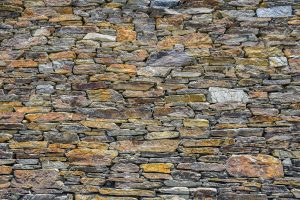
By Hector J Rivas on Unsplash
But the wall is made of unpleasant feelings, isn’t it? Bitterness is the result of unresolved unpleasant feelings. So it’s really not protection. It’s reinforcement. It’s the thing closest to us pulling our focus from happier thoughts and feelings. It’s a constant negative reminder. It locks us in place with it, and it blocks any kind of relief.
As I’ve lived my life the last couple of weeks, interacting with and observing others, listening to the inside of my own head, I’ve made a list of walls we lean against:
Victimhood (closely allied with bitterness.)
Blame (oooh, this is a juicy one. “It’s not my fault. I have no responsibility, and therefore no power.”)
Denial (leaning on the wall, eyes squinched shut: “No, I won’t believe that! No, it’s not true! No, it’s not happening! It’s too scary! I’ll only accept what makes me feel good and in control!”)
Chronic health problems (“I would _________, but I can’t because I’m sick.” Sigh. Moan. Groan. Someone once said to me, “I don’t know what I’d do without my pain!” as though pain was her lover.)
Lack of money (“I can’t be happy. I can’t have/do what I want. I can’t experience abundance. I have no power.”)
Perfectionism (a personal favorite. “I would, but I’m afraid to because I won’t do it perfectly! So, no point in trying. I’m imperfect and therefore can contribute nothing of value, not even myself. Expect nothing from me. ‘Cause I’m so imperfect.”)
I don’t suggest we’re never victims, never have health problems, never experience financial scarcity. I don’t minimize the challenges of perfectionism or fear or the seduction of blame. However, constructing a wall out of such experiences and feelings and deciding to spend the rest of our lives leaning against it seems like a dubious choice. It may feel like it props us up and allows us to survive, but is survival the best we can hope for? Is leaning against a wall to stay on our feet the best we can do?
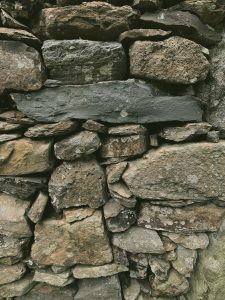
By Christina Botelho on Unsplash
Can a wall made of bitterness stand by itself? If we choose to step away from it, support ourselves, will the wall crumble? I wonder. What if the wall needs our support more than we need its support? It takes a lot of energy to maintain a wall.
What would happen if we just fell down instead of constructing walls to lean against? Better yet, what if we choose to lie down now and then, take a break, look at the sky, feel the world on our skin and beneath us? What if, when we feel hurt or despairing or sick or broken, we lay still and whispered, “Help!” and rested and waited for something or someone to come along and give us a hand back to our feet? If we’re not leaning (cowering) against walls, we’re in full view. Life can find us. Friends can find us. Help can find us. Hope, inspiration, and comfort can find us.
Walls can be useful. But they can also imprison us. They can be strong and organic and lovely, as in healthy boundaries. They can be poorly built and inadequate, too. Or just old and tired. Crumbling. Falling down. Gnawed away by Time’s tooth.
I ask myself, with all the world before me, why do I choose to lean against walls that separate me from it? Is that what I mean by safety?
Questions:
- What walls do you lean against?
- Do you think of a wall as protection or prison?
- How have your walls let you down?
Leave a comment below!
To read my fiction, serially published free every week, go here: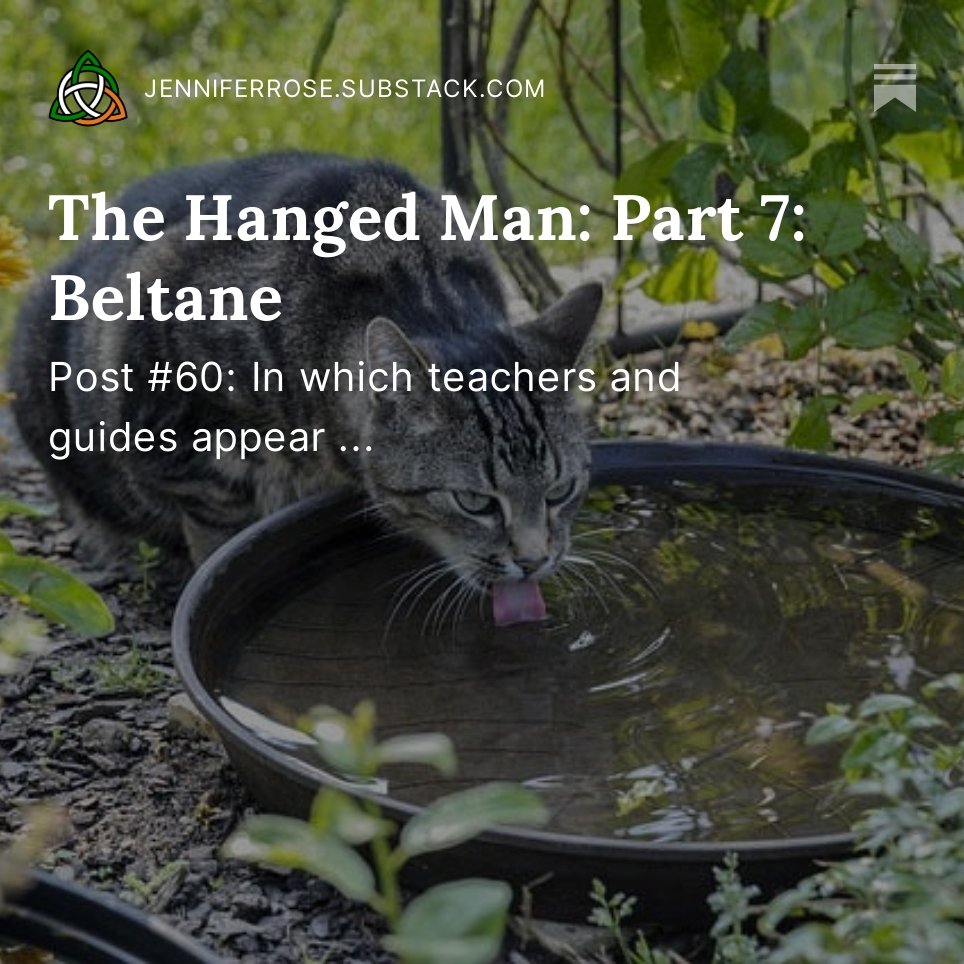
by Jenny Rose | Feb 11, 2023 | Connection & Community, Parenting
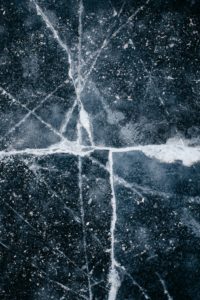
Photo by Tom Barrett on Unsplash
February. A couple of days with -40 degrees wind chill here in Maine that felt apocalyptic. A dead car battery. At work, a broken pump in one of the pools, private swim lessons, ill team members, and an upcoming lifeguard recertification training this weekend, which I’m sure I’ll pass. Probably. A $250 “unscheduled delivery charge” on a $500 + propane bill, as though the brutal cold was somehow our fault. A possible estate tag sale on the contents of my mother’s untenanted house in Colorado, as she now lives in memory care.
The sound of the cardinal at the birdfeeder. The cats basking on my desk in the morning sun. Blueberry lavender tea. The scent of a lavender candle. Imbolc, when the wild maiden returns. The Ice Moon, or, if you prefer, the Storm Moon. Daylight arrives earlier and lingers later.
Through it all, I think about The Mother. The Mother the wild Imbolc maiden might become. The Mother who nurtures, creates, carries the possibility of new life and beginnings within us. I think of biological mothers who labor and deliver a new baby into the world. I think of foster mothers, substitute mothers, women who grieve for their empty wombs. New mothers. Struggling mothers. Mothers whose children have grown and gone, or just … gone.
Sisters and aunts and grandmothers. The long line of mothers who stand behind our own mothers.
Myself as Mother.
I wrote down a quote recently. Unfortunately, I didn’t write down the source of the quote! I always think I’ll remember and then I don’t. Never mind. If it’s yours, let me know and I’ll give you full credit!
“A mother without fear of her own potential.”
There are so many ways to unpack this. A creator, an archetypal mother without fear of her own potential. Is there any artist or maker alive who doesn’t struggle with his or her fear of failure and success?
A young woman, simmering with hormones, discovering the power and potential of her sexuality in the context of rape culture and patriarchy; risking unplanned pregnancy, sexually transmitted diseases, violence, heartbreak, health, and even life.
A woman who longs to be Mother but cannot conceive, or carry, or deliver a living child. The yearning. The agony. The grieving and despair at being unable to fulfill such an overwhelming biological imperative. A woman who feels herself a vessel of death rather than a vessel of life.

Photo by Laercio Cavalcanti on Unsplash
A mother, the sweat of labor still on her face, swept with a ferocious love for the infant she’s just birthed, a love terrifying, passionate, transforming the landscape of her life irrevocably and forever.
A mother, lined, weary, anguished over her child’s unhappiness, ill health, addiction, behavior, wounds, choices, death. The passion of her pain equals the passion of her love. The passion of her rage and fear equal the passion of her love. How can this child we carried and cherished and loved so deeply, this child we would have defended with our teeth, our fingernails, our life, make self-destructive choices? How can they refuse to love themselves? How could we have failed to protect their health and happiness?
The ability to love like a firestorm, like a hurricane, like an earthquake, most would agree, is exciting and wild, a beautiful force of nature, perhaps the most powerful feeling in the world. But never forget passion cuts both ways. If we release and allow the potential of our love, we have opened ourselves equally to grief, loss, rage, unendurable pain.
I am a mother. I fear that potential.
Not that I had a choice. The feel of my newborn sons in my arms overcame me as powerfully as labor did. I was helpless before it. Their wellbeing and existence twined inextricably with mine in an instant. I made no conscious choice and had no conscious control enabling me to stand back from my potential as Mother.
I was Mother. They made me into Mother. I can never go back.

Photo by Liane Metzler on Unsplash
Yes, I know, boundaries are important. Individuation is important, as are freedom, letting go, and a hundred other facets of emotional intelligence I’ve written about on this blog. But I’m not talking about the long road of motherhood here, where we learn and stumble, fall down to rest, weep, get up, learn and stumble again. I’m talking about the timeless primal bond, deeper than language, deeper than reason. The wild love that works through us. Divinity, perhaps. Some would say The Devil. Whatever it is, it’s bigger than us. Bigger than me, anyway.
Do we imagine our own mothers feeling about us as we do about our children? Can we imagine it?
I can’t. If my mother felt for me what I feel for my sons, the tempest of her passion was never expressed in a way I understood it. Not in words, not in touch, not in action. Now, as she drifts in her dementia, I wonder, though, if she did feel as I did, but some great wound or constriction in her heart, now loosened because she does not remember it, did not allow her to express it. Perhaps her fear of her own potential as Mother was too great to allow her to demonstrate the depth of her love.
If so, I can understand. I can forgive.
Can I forgive myself as Mother? Can I forgive the things I didn’t say and should have, the things I did say and shouldn’t have, the unintended hurts and consequences as I made choices and lived my life? Can I forgive my inability to keep them safe every minute of their childhoods? Can I forgive my ignorance, my lack of understanding regarding their needs and challenges?
I used to tell a story about an orphaned boy who was “so lonely and so hungry nobody wanted to be with him.” That phrasing always made me fight tears when I spoke it. More than my many imperfections as Mother, can I forgive the way I tried to abandon the Mother part of myself? As my sons grew into manhood and began to live their own lives and I saw their challenges and pain, the Mother in me was too lonely and too hungry. Too filled with pain and rage, grief and shame. I turned away from her for a time, walked on without her, left her alone in the wilderness to live or die, as long as I didn’t have to experience her hunger, her loneliness, her feelings.
With my first child, I claimed the potential for Mother within myself. I flung myself into it, holding nothing back, having no thought of caution or reserve. And then, years later, I rejected it, abandoned joy and love because I could no longer face the pain. I severed myself from my own mother. I severed myself from my experience of Mother. I sundered myself and lived for a time with a cleaved heart.
But my love is a blind thing, a feeling without reason or logic. No matter the distance between my mother and myself, my sons and myself, my love did not diminish. Nor did the suffering that goes with it. The internal Mother I evicted grieved and wept. She lit candles and raged and feared and prayed for peace, for all to be well. She scratched at the windows of my life, whispered dreams beside my pillow, followed me like an abandoned spirit. She is mine and I am hers, though I tried to cast her away.
I know I will never be whole without her. The child within me, the crone I am growing into – both need the Mother. I need her as I care for animals and people, as I nurture new life in the garden, as I teach children to swim, as I write, as I cherish my friends and family. As I cherish myself.
Perhaps I simply needed a break from the pain. Perhaps I could not learn to love myself while being battered by the needs and demands of my mother and my sons. Now, my ability to care for and nurture myself gives me a place to pause, to rest. Perhaps, as I age, I am growing in wisdom, losing not the depth of my love, but the frantic edge that cuts so keenly. Love, after all, endures. Motherhood endures. I am the sum of my parts plus a little more. I cannot decide to be less. I might as well accept all of myself, reclaim all of myself, be all of myself. 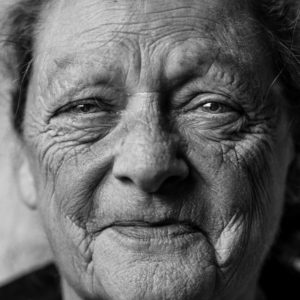
And so, I’ve returned, Mom. We were not a perfect mother and daughter, you and I. We each did our best, and now my best is better than that. Let there be peace between us now, at the end. I have never stopped loving you. And Mother of my sons, cease following me just out of sight. Come in. Let us soothe one another’s weary regrets and scars. We loved with everything we had. Those we gave life to were never ours to keep. They must walk their own paths. Let us find a way to release our love from our pain.
Let us reclaim one another.
Questions:
- What was your experience of being mothered?
- What has been your experience of being a mother in the wide sense, as a creator, a biological mother, or a substitute, surrogate, or foster mother?
- What potential in yourself do you fear?
- Who in your life has been so hungry and so lonely nobody wanted to be with them? Have you ever felt like that person?
Leave a comment below!
To read my fiction, serially published free every week, go here: 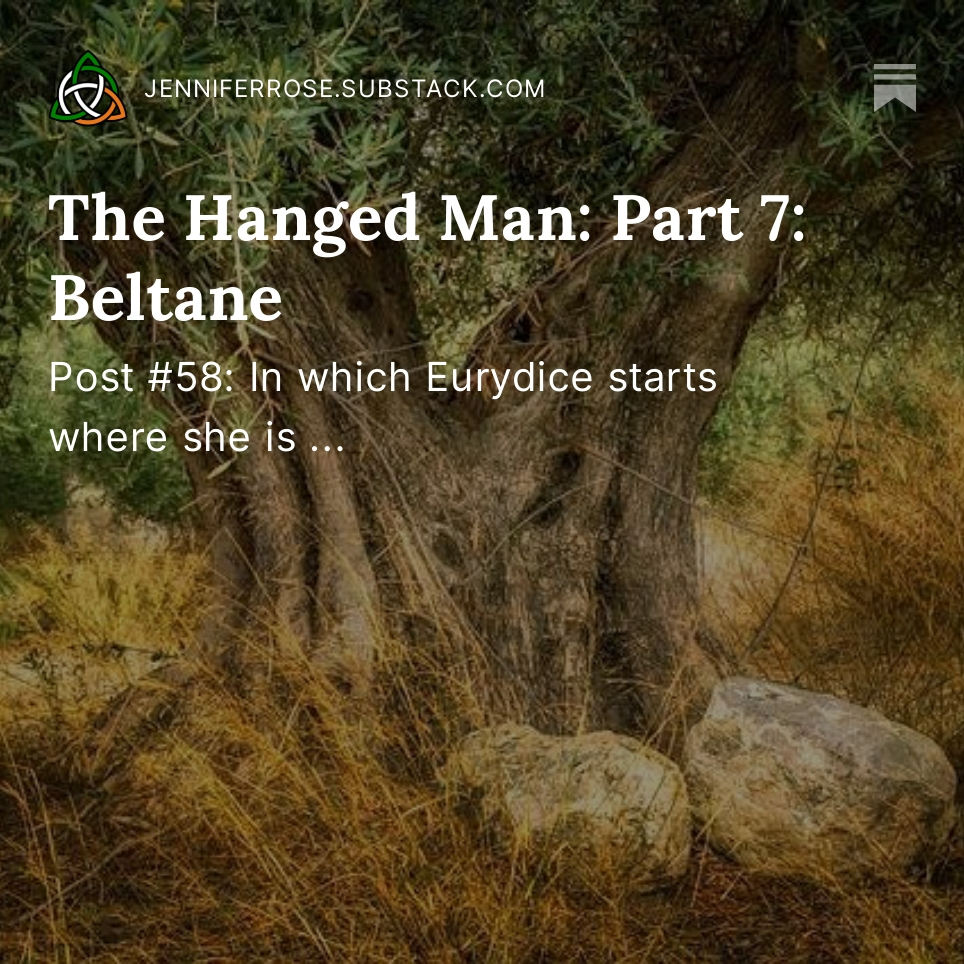
by Jenny Rose | Jan 28, 2023 | Emotional Intelligence, Feelings
As I write this, I have just returned from a long journey across the country and into my past. I’m home again, but the journey is not over and I expect to retrace my steps back and forth for some undetermined length of time.
The physical journey, however long, is nothing to the internal journey I’ve undertaken through my memories, family dynamics and history, and so much of what has shaped my life and experience.
Before I left, I came across this poem by David Whyte:
Here in the Mountains
There is one memory deep inside you.
In the dark country of your life
it is a small fire burning forever.
Even after all these years
of neglect
the embers of what you have
known rest contented
in their own warmth.
Here in the mountains,
tell me all the things
you have not loved.
Their shadows will tell you
they have not gone,
they became this night
from which you drew away in fear.
Though at the trail’s end,
your heart stammers
with grief and regret,
in this
final night
you will lean down at last
and breathe again on the
small campfire of your
only becoming.
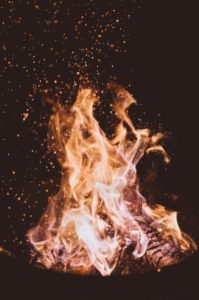
Photo by Joshua Newton on Unsplash
“Tell me all the things you have not loved.” This is an invitation I’ve never heard before. My focus has been on gratitude, on reframing, and on finding something good in every situation. I call myself a pessimist rather than an optimist, though I do leave windows and doors open for good things to happen while preparing for the worst.
My friends and I talk at work about the way we avoid “complaining.” A male coworker was taught as a child to refuse to give way to pain and illness, to work through it silently and privately without “complaint.” Is complaint the same as acknowledgment? I’m not sure. Three of us, all women, are more comfortable acknowledging our struggles and distress than our male friend, but none of us want to hear ourselves “whining.” Is whining the same as acknowledgment? I’m not sure about that one, either.
Because of my own confusion and blurriness around the terms we use and the cultural pressure towards toxic positivity, speaking about the things we have not loved is a jarring proposal. I carried it as I traveled on cars and buses, airport shuttles and airplanes. I hardly wrote at all over the last week. One journal entry by hand on the plane and the rest of my notebook filled with to-do lists, notes, names and numbers.
But I thought about things I have not loved.
It’s not just the invitation, though. It’s the way Whyte suggests all the things we have not loved are the background against which our lives are pinned, the shadows defining the light. I think of the night sky, gleaming with stars. What would the stars be without the blackness around them? I think of candle flames, fireflies, a lone campfire in the wilderness in the black night.

Photo by Jeremy Thomas on Unsplash
And isn’t it true that the things we have not loved don’t go away? Don’t they stay with us more inexorably, in fact, than the things we have loved? It seems so to me. Thus the fear, the drawing away, the heart filled with grief and regret. But at the core of our lives perhaps there is a small fire, patiently burning, waiting for us to come to our trail’s end. I think some would call the small fire God.
I realize one of the largest things I have not loved is love. A strange thing to realize, and a strange thing to say, I know. But so often my love has been helpless. The strong bonds, history, and feeling (all of which I mean by “love”) I feel for my parents, my brother, and my sons have been the greatest sources of pain in my life. Five vast, dark, wildernesses surrounding five campfires, these five who are flesh of my flesh, blood of my blood. These five who I could never stop loving, even if I wanted to. No matter how great the shadows around the fires, the flames burn, warm, beautiful, cleansing, regenerative. Often, I wish I could stand just outside the firelight, unseen, and simply love without fear, without pain, without wishing to be loved in return. But I do draw away in fear from the heat, the flame, the passion of the fire. I cherish the fires and would protect them with my life, but I fear them, too.
I have not loved the trauma and abuse that has shadowed what I love. I have not loved my disillusionment or the terrible choices I’ve made in building boundaries and learning to love myself. I have not loved my feelings of loss, insecurity, scarcity, and exile. I have not loved my pain and grief. I have not loved learning to let go.
I did not love walking into my mother’s home, the place where she has lived her self-imposed solitary journey into dementia and inability to care for herself. I did not want to follow her trail into the darkness of fear and denial, marked with soiled clothing and bedding, desperate and increasingly nonsensical and illegible notes and reminders. I did not want to go through drawers and cupboards of vitamins and supplements; over-the-counter remedies for pain, sleep, memory loss, skin problems and digestion issues. I did not want to fill trash bags with worn-out but never discarded clothing and shoes, a thousand used emery boards, outdated products and food.
I did not love going through every stitch of her clothing, sorting, washing, labeling with a laundry marker and packing it all to take to her new home in a memory care unit. The day after I carefully loaded her dresser, newly cleaned and placed in her room, we visited and found she had dumped every drawer into her laundry basket. She was “packing” to go home.
I did not love doing any of it. I did not want to do it. It broke my heart and filled me with futile guilt and shame. But at the center of every bag of trash, every bag and box to be donated, every clean drawer and cupboard, burned the small fire of my love for my mother. Inescapable. Inexorable. In a strange way, all the things I did not love were fuel to keep that fire burning. The more shadows I found under beds, in closet corners, in drawers and cupboards she forgot she had, the brighter the fire burned. My pain and pity, my anger with her lifelong pattern of denial and rejection of any help or support, made the fire burn higher. To tend the fire is to face the darkness.
And I would not have the fire go out, though I feel torn into pieces by its presence.
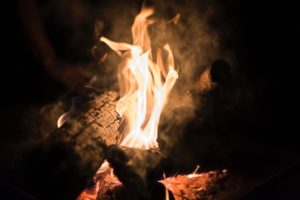
Photo by Josh Howard on Unsplash
It’s been a dark week, a week of deliberately moving into the things I have not loved. Drawing back was not an option. I could only step into the void. But the darkness has held a thousand small flames. The faces of old friends, both mine and Mom’s. Her animals, once so beloved but now forgotten by her, rehomed and doing well. A hundred acts of kindness and generosity. Help with moving furnishings into her new room. A cherry pie. Hugs and tears. The good-hearted friendliness of dogs. Constant support. Texts, emails, phone calls – all messages of succor and sympathy for me and my brother, for Mom. The friend who cares for the plants. The friends who keep an eye on the house. The friend who took a load to Goodwill for me. The friend who will take out the mountain of trash in the garage. And, when I came home, the arms of the friends who welcomed me back.
The shadows and the light. The things I have not loved cradle the things I do love. I am so weary I cannot begin to unravel the paradox. Perhaps it cannot be unraveled, only accepted and experienced. Perhaps Mom is wandering in her own dark wilderness, seeking the small campfire of her becoming, and when she finds it, leans down to breathe upon it, she will at last know peace.
Questions:
- Share three things you have not loved.
- Do things you have not loved persist in your life? What creates a background for what you do love?
- What is the difference between complaining (whining) and acknowledgment? Do you believe it’s wrong for you to admit to personal struggles?
To read my fiction, serially published free every week, go here: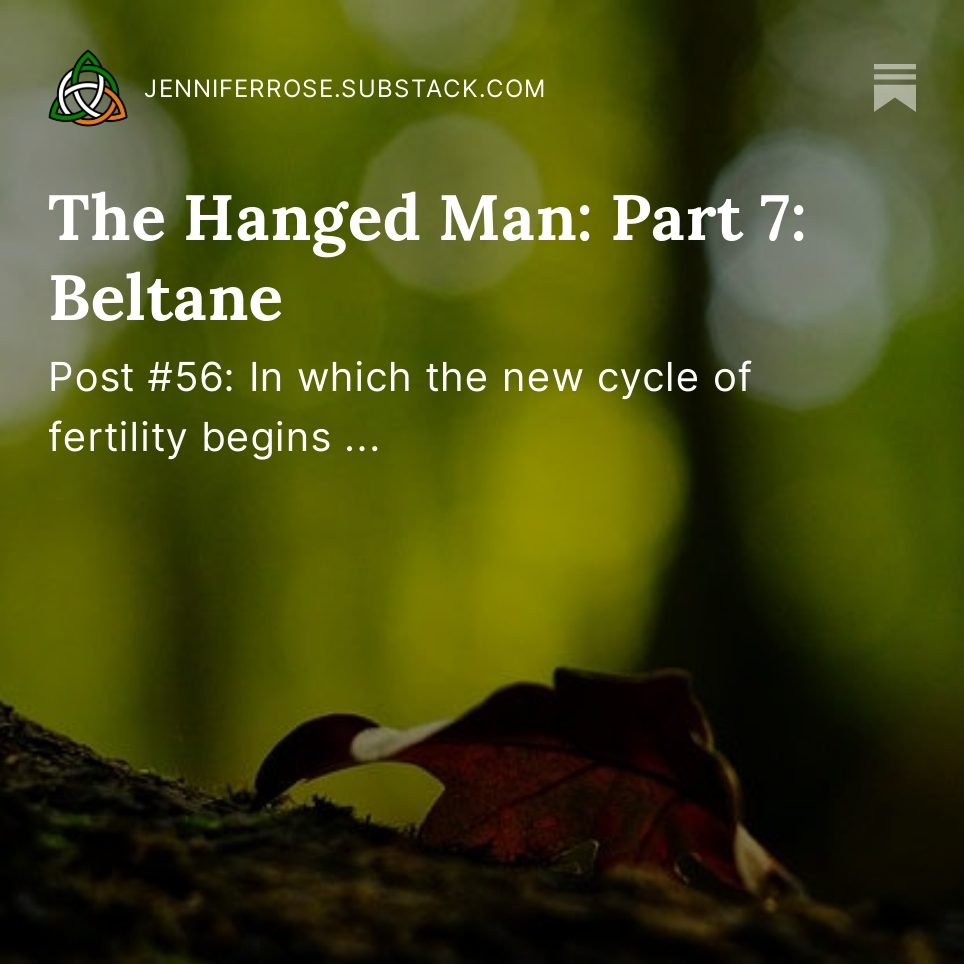
by Jenny Rose | Nov 19, 2022 | A Flourishing Woman, The Journey
I was taught, as a child, it was my job to alleviate distress. One must always respond immediately and help the sufferer. It went far beyond duty and obligation. If I did not fix the distress of others, my childish world would fall apart. Everyone would leave.

Photo by Cristian Newman on Unsplash
For a child, such consequences are death.
I was also taught “help” meant doing anything and everything I was asked to do, immediately, unquestioningly, and unendingly. My own distress was of no consequence at best and a direct threat, an unwelcome competition, at worst.
That core teaching stayed with me as I grew up, and has been a keynote of my behavior and experience most of my life. I wanted to help people. When people around me suffered, I felt an overwhelming, painful panic, as well as complete responsibility. I had to do everything I could, give the situation my all in order to “help.”
I also grew up with an inability to respond to my own distress. Hunger, thirst, fatigue, emotional and physical pain, were all ignored. My disconnection from my own needs and experience led me into chronic pain, eating disorder, depression, and anxiety. I was unaware of my traumatic wounds. I had no interest in helping myself. Helping myself was selfish, bad, and unloving.
Then I studied emotional intelligence and all the work and therapy I’d done over the years with guides and teachers as well as on my own (see my Resources page) wove together into an intention to reclaim my health and my self.
This blog has been a key part of that work.
I still don’t like to watch people suffer, but I’m more careful now about “helping.” I’ve learned suffering is not necessarily the enemy. We get ill, have painful emotional and physical injuries, have uncomfortable feelings. We age and our bodies and sometimes our minds wear out. To be human is to experience these things; they’re inescapable. We can’t control what happens to us, but we can control how we deal with such events. When someone is suffering, I’ve learned to be less reactive, to remember it’s not my fault or my responsibility to fix it. I’ve learned to notice whether the sufferer is helping themselves before I jump in.

Photo by Joshua Earle on Unsplash
I have learned a bitter lesson: No one can help someone who will not help themselves.
I realize now we can’t always go back to where we were before we were wounded; we can’t always heal the wound itself. Sometimes our wounds and suffering are taking us into something new and what’s called for is not healing, but tolerance and patience.
What does “help” mean? This is an important question. Does help mean we respond promptly to all demands, whether or not they are safe, sustainable, or even possible? Does help mean we make thoughtful, intentional choices for safety and practicality even if those choices go against what we are being asked to do in terms of “help?” Do we decide what the best “help” is, or does the sufferer get to choose what kind of “help” they want?
I’m still uncomfortable talking about my own pain. Honestly, I’m still uncomfortable even noticing it, but I practice every day at staying present with how things are with me. It feels selfish and wrong, but I know that feeling doesn’t mean it is selfish and wrong, just that it’s very different from my early training. Sometimes the choice that feels worst is the best choice. Sometimes suffering is the only possible road forward into peace, growth and resilience.
None of us has the power to help anyone avoid suffering. I confess I’ve argued with that reality all my life, but it hasn’t done a bit of good. In fact, it’s done harm, most of all to myself.
I have occasionally, in the depths of anguish, asked for help. When I do that, what am I asking for?
Nothing tangible. Not money or a thing. Not love. Not sex. Not a gallon of ice cream. I’m not asking for someone to come along and fix it all, or take responsibility.
I’m asking to be heard. I’m asking for someone to say, “I’m here. You’re not alone. I believe in you. I know your goodness, your strength, your courage.” I’m asking for a safe place to discharge my feelings. This might involve snot, wet Kleenexes, rage, and a raised voice.
A safe place is not a place where someone else takes responsibility and fixes, or asks me to stop feeling my feelings, or is clearly uncomfortable with my suffering. A safe place is provided by someone with healthy boundaries who is willing to witness my distress without feeling compelled to fix it.
Witness. A witness. That’s ultimately what I want. Just someone to be there with me for a little while. I can face my own demons and challenges, but I can’t do it all alone.

Photo by Gemma Chua Tran on Unsplash
None of us can. We are social animals. But we can witness for one another. We can sit quietly, holding a safe space without judgment or a fix or advice, and just witness. Pass the Kleenex.
It’s the hardest thing in the world for me to do. Simply witnessing seems so passive, so weak, so useless. Someone right in front of me is deeply distressed and I simply sit like a bump on a log witnessing? Are you kidding me?
Surely, I can do better than that. I can do more than that. It’s up to me to make their suffering stop!
And yet. And yet. Isn’t finding a witness incredibly hard? How many people in our lives can take on such a role? What an inestimable gift, to be willing to walk beside someone who is suffering, to be willing to stay, to not look away. What if our boundaries were so healthy we could do that? What if we weren’t afraid of suffering? What if we were wise enough, strong enough, to make room for it and sit down beside it?
Someone I love is in great anguish of spirit. They beg me for help, but a very specific kind of help which is ethically and practically impossible for me or anyone else to give. Which makes me an enemy. Which makes my loved one even more alone than they already feel, more victimized, more powerless, more confused.
There is nothing about this that doesn’t suck. I dread the phone calls beyond words because I don’t want to witness this suffering. It feels unbearable. But my loved one must bear it, and if they have to, I can. I choose to witness. It feels like nothing. It’s not what’s wanted. But at this point it’s all I can do. So I will keep calling and answering calls. I will get up in the morning and talk to case managers, nurses, CNAs, palliative care consultants, nursing homes, and whoever else will talk to me. I will update friends and family. Then I will get up the next morning and do it again.
I pray there is some power in witnessing, some rightness. I pray that somehow my love and willingness to remain a witness does a little bit of good, provides some small comfort, lights a candle in the darkness of dementia, even for a moment.
And I search inside my own suffering for wisdom, for healing, for grace, and for faith.
To read my fiction, serially published free every week, go here:
by Jenny Rose | Sep 24, 2022 | A Flourishing Woman, The Journey
As I’ve thought about this post, I realize the theme of being lost and found is a thread running through my life and my writing. Years ago, when I was first introduced to Clarissa Pinkola Estes and devouring everything I could find by her, she used a phrase I’ve never forgotten: everything lost is found again.
Everything lost is found again.
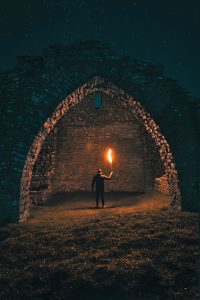
The possibility of that truth gave me deep comfort, something I badly needed in those days.
Maybe we don’t find all the things we lose in our lifetimes, and maybe not in our deathtimes. But maybe someone else finds what we lost. Or maybe what we lost comes back to us looking so different we don’t recognize it. Or maybe what we lost is not truly lost at all. We carelessly leave things behind, or we amputate them, or we deny they were ever there in the first place. We fear we’ve lost them. We try to lose them. But maybe they never really leave us, they just hide somewhere in the attic of our minds until we need them. We ascend the stairs, enter the musk and debris of years, all the broken, aging, outdated and rejected parts of our lives and ourselves mouldering together in cobwebs and dust.
I like to imagine that.
I’ve posted before about being lost and found. I went back and read it as I worked on this post, so as not to be repetitive. That post was a seasonal meditation on the nature of change. I didn’t explore it quite from the angle of losing to find.
I came across a quote recently from Kristin Martz: “We lose ourselves in the things we love. We find ourselves there, too.” It made me smile, and think about the parts of my life so deeply absorbing I am self-forgetful as I live them. My head is empty. I am pure being, without self-consciousness or anxiety. Time does not exist. I feel a kind of boundary ecstasy, an awareness of connection to everyone and everything, an essential and lovely part of some greater whole.
Perhaps during such times we lose all the crust, the armor, the accumulation of useless and punishing junk we’ve somehow picked up or been taught, and are pared down to who we really are in our souls and spirits.
Many of us don’t want to let go of our junk, though. It’s been with us so long it forms part of our identity, part of our story, and we don’t want to let it go. Then who would we be? How would we recognize ourselves? What might change? What different or challenging things might we be required to do? We don’t take the leap into anything we might lose ourselves in, so we never fully find ourselves, either.
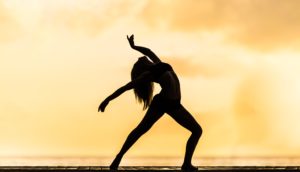
Photo by David Hofmann on Unsplash
Maybe the times in life when we truly feel we’ve lost it all are also the times we’re finding unimaginable grace and meaning.
It’s a circle, a natural life cycle, an ebb and flow of experience.
Another thing I came across somewhere years ago is the idea of an older, wiser version of ourselves, always at our shoulder supporting, advising, guiding, and cheering us on as we journey through our lives. I often make a picture of it in my mind, myself as an old (well, older!) crone, holding my hands out to a younger, struggling self the same way I hold my hands out to children I’m teaching to swim.
“You can do it. I’m right here. I won’t let go of you. You’ve got this! Now … swim!” Or jump. Or put your face in the water.
“Risk,” my elder self says, “dare, follow your heart, do what you need to do for yourself. Go ahead, write, it, dream it, imagine it, enjoy it. Be happy. Play. Rest. This is the way forward.”
And, “I believe in you.” That’s what I most long to hear.
I know it’s terribly cliched, but lately I’ve been thinking about what life means. Does it mean anything? Can anyone say what it means, or must we all make our own meaning? I lean toward the latter. I’ve wondered before what life is for, what I am for, but always in soul-dark times. This is not a dark time for me. In fact, I’m gradually coming back into the light. Now the question is a curiosity, a toy, and my answers are not concrete, not a vehicle for getting through another day, but more intuitive and less formed into language.
I keep going back to that quote: “We lose ourselves in the things we love. We find ourselves there, too.”
Losing everything to find something. There’s some kind of deep truth in that my intellect can’t quite grasp, but my spirit does.

Photo by Cristian Newman on Unsplash
I wonder, with an inward smile, if that’s not my answer for the meaning of life. Finding myself, however that happens. Paring away all the scar tissue and junk, losing and losing and losing the people and places I thought were part of my identity, along with objects, money, youth, innocence, and countless other small, ordinary losses we all experience until the best, most extraordinary me is revealed. Wouldn’t it be ironic if the meaning of life is nothing more than to immerse ourselves in it, cherish our physical experience and pleasures, give ourselves to those activities in which we lose ourselves …
… and find ourselves?
No philosophy. No agonized handwringing or intellectual labyrinths. Just body, soul, joy, and loss. And discovery on the other side of loss.
Maybe the meaning of life is simply to live.



















